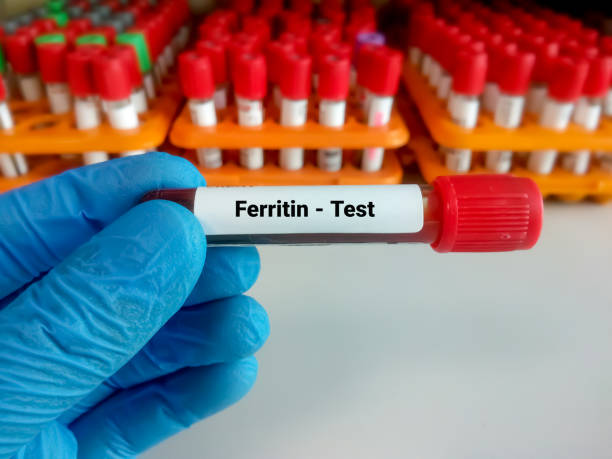
Ferritin Test: Purpose, Normal Range, and Results What They Mean
Time to read 7 min
Time to read 7 min
Table of contents
The Ferritin Test measures ferritin levels in the body. Ferritin is a protein that is responsible for iron storage in the body and its cells. The ferritin test is an important diagnostic tool for assessing iron levels in the body and detecting various health conditions, such as iron deficiency anemia and iron overload disorders.
Ferritin stores iron in the body; thus, ferritin levels in the blood help measure iron levels in the body. Ferritin plays a vital role in regulating free iron levels in circulation within the body's cells, thereby supporting iron homeostasis and normal ferritin levels. Primarily, ferritin is found in cells of the spleen, liver, marrow, skeletal muscle, duodenum, and other parts of the body.
This article explores all about the Ferritin Test, its purpose, normal range, results, and what your test results mean. So keep reading.
Ferritin protein stores and releases iron inside the cells to maintain healthy iron levels in the body. Ferritin is necessary for iron regulation in the body, which is crucial for producing healthy red blood cells. Iron is a mineral that is essential for various bodily functions, such as hemoglobin production (a part of red blood cells), which carries oxygen in the blood.
Iron also plays an important role in other crucial physiological processes of the body, including DNA synthesis and energy production. Ferritin stores iron and releases the undesired iron depending on the body's requirement, maintaining a healthy supply of iron for bodily functions.
The ferritin test measures the blood protein ferritin levels in the body. Ferritin is responsible for the storage and release of iron in the body. Iron is essential for the production of red blood cells that transport oxygen across the body and may be supplemented with iron supplements, but may also require additional blood tests to monitor level. Iron is also crucial for healthy bone marrow, muscles, body organs, and brain development in kids.
The Ferritin Blood Test is also known as the iron ferritin test, serum ferritin, serum ferritin level, and ferritin serum. Too much iron or too little iron in the body can be associated with severe health conditions if not detected and treated early.
Typically, the Ferritin Test is performed to:
The ferritin test normal range depends on age, gender, and certain other factors. Various laboratories and diagnostic centers may use a slightly varied serum ferritin normal range. It is advised to consult your healthcare provider to discuss your particular test results, especially if they indicate abnormal ferritin levels.
Refer to the table mentioned below for comparison of ferritin test normal range in males and kids:
Age Group |
Ferritin Test Normal Range (ng/mL) |
Newborn babies |
25-200 ng/mL |
Kids (1-5 years) |
7-140 ng/mL |
Children (6-12 years) |
10-150 ng/mL |
Male Teenagers (13-18 years) |
12-150 ng/mL |
Female Teenagers (13-18 years) |
10-120 ng/mL |
Adult Males |
20-500 ng/mL |
Adult Females |
20-400 ng/mL |
Elderly Males |
20-300 ng/mL |
Elderly Females |
10-150 ng/mL |
High or low ferritin level means abnormal iron levels in the body. Too high or too low iron levels may be a sign of serious health concerns. Let's explore the high and low ferritin levels in detail.
Low levels of ferritin suggest iron deficiency or anemia. If your ferritin test results show lower levels, your healthcare provider may recommend more tests for a better picture of your body’s iron levels. They also need to figure out the causes of low iron levels.
Typically, in adults, low ferritin levels are associated with ongoing blood loss, heavy periods, and other causes. Low ferritin levels in children may be associated with a poor diet. Certain medical conditions in children as well as adults make it difficult for the body to absorb iron from the food you eat, causing low ferritin and iron levels.
Low ferritin levels indicate iron deficiency that can be caused by:
Common signs and symptoms of low ferritin levels or iron deficiency include:
High levels of ferritin in the body mean hemochromatosis (iron overload) or high iron levels due to overconsumption of iron pills or multiple blood transfusions, indicating potential excess iron. Some individuals may have elevated ferritin levels without having high iron levels. It happens because of infections, inflammation problems, autoimmune disorders, and certain types of cancer.
The common factors responsible for causing high ferritin levels are:
Some common signs and symptoms that indicate iron overload or too much iron in the body are:
|
Ferritin Level |
Explanation |
Causes |
Symptoms |
|
Low |
Iron deficiency or anemia |
Insufficient iron consumption, poor iron absorption, extreme or constant blood loss |
Headache, tiredness, fatigue, loss of energy, pale skin, shortness of breath, heart palpitations |
|
Normal |
Adequate iron storage and release |
Proper iron intake and absorption |
No symptoms |
|
High |
High iron levels, iron overload, or potential inflammation |
Hemochromatosis, inflammatory diseases, liver conditions, and certain cancer types |
Fatigue, joint pain, skin discoloration, abdominal pain |
A healthcare professional may prescribe Ferritin to detect various medical conditions because the test measures the amount of ferritin in the blood, and in other medical scenarios:
The ferritin test price in India depends on certain factors; however, generally, the ferritin test cost ranges between INR 300 to INR 1200, depending on the laboratory or the city. The serum ferritin test price that involves home collection may differ from the actual test cost.
For instance, the Ferritin test costs in various Indian cities:
Many diagnostic centers and laboratories, including MyDiagnostics, offer affordable health packages along with home collection services and great deals and discounts.
The ferritin blood test assesses the levels of ferritin in the blood. Here is what you should know about the procedure and preparations:
A medical professional will insert the needle into the vein to withdraw a blood sample. Then the sample will be sent to the laboratory for testing. You may experience mild pain or discomfort in the injection site; that’s normal.
Usually, you dont have to do any specific preparations before the Ferritin test. In case other blood tests are also being performed along with the ferritin test, your healthcare provider may ask you to fast for 8-10 hours before the sample collection. Make sure your doctor is aware of the medications, supplements, and biotin you are taking. Also, inform your healthcare provider if you smoke or consume alcohol.
Typically, the ferritin blood test results can be collected within 24-48 hours and may take longer in some cases.
Ferritin and iron are closely associated with each other, but they are not the same. Ferritin's function is to store iron in the body; it's like an iron reservoir and maintains healthy iron levels in the body.
Of course, if your hemoglobin is normal, you may still have low ferritin, which indicates iron deficiency without anemia, highlighting the need for testing normal ferritin levels. Sometimes it is referred to as non-anemic iron deficiency.
Some supplements, such as biotin and an iron supplement, may significantly influence the ferritin levels before the test. Your healthcare provider may ask you to stop taking such supplements at least 24-48 hours before the test.
The ferritin test is performed to examine the ferritin concentration in the blood through a simple blood draw. The ferritin is responsible for regulating iron levels in the body by storing and releasing it depending on bodily requirements. Low and high ferritin levels are associated with various medical conditions.
Health care providers can use the ferritin test to detect several illnesses, including iron deficiency, iron overload, and inflammation, and to screen iron-related condition's treatment efficiency. Early diagnosis of these health problems can significantly improve the effectiveness of the treatment and patient outcomes, averting further complications.
***Medical Disclaimer - The following information is for educational purposes only. No information provided on this website, including text, graphics, and images, is intended as a substitute for professional medical advice. Please consult with your doctor about specific medical advice about your condition(s).
